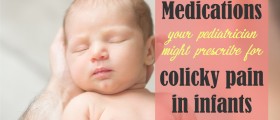
Acid reflux in infants is relatively common, and the number of cases reported to pediatricians is increasing. This problem does not represent a medical emergency and it should go away relatively quickly after following simple diet tips and post-feed methods.
The main sign of acid reflux in babies is throwing up immediately after feeding. It can be treated with gripe water, with simple and safe home remedies recommended by a doctor and by feeding in intervals.
Causes and symptoms of acid reflux in infants
Acid reflux affects both infants and adults. When it affects adults and it is persistent, it is called gastroesophageal reflux disease or GERD. Acid reflux occurs when the contents of the stomach climb up back the esophagus and they are expelled through mouth, leaving a bitter taste.
Esophagus is a long tube connected to the stomach. It ends in esophageal sphincter, a round muscle that contracts and prevents the contents of the stomach from coming back up. However, esophageal sphincter in infants is not yet fully developed and it does not always close properly the stomach. The food and digestive juices come up and cause significant discomfort for the baby.
This starts happening approximately 10 days after the baby is born and it can go on for three months. If it persists after the baby reaches certain age, acid reflux can pose a problem and it can result in inadequate weight gain and growth, lack of energy, spitting of green bile and decreased urination.
Treatment for acid reflux in infants
The digestive system of newborn babies is very sensitive and doctors cannot prescribe heavy medications that would normally be prescribed to an adult for acid reflux. Generally, pediatricians recommend avoiding foods that cause acid reflux and adopting certain feeding habits and methods.
It is always better to breastfeed than to feed the baby with formulated milk. While breastfeeding, the baby should be in an upright position, and not inclined horizontally.
After feeding, the baby should remain in upright position for at least 30 min, so the food can go down into the stomach. Complete digestion of the food can be assured by belching, which is stimulated by gentle taps on the back.
Meals should be light and given at regular, frequent intervals.
Any changes in diet plan should be determined by a pediatrician. This includes introduction of solid foods.
In most babies problems with acid reflux can be solved by following these easy steps. However, if the problem persists, there are medications that are suitable for babies and that are prescribed in order to prevent negative effects of acid reflux on the infant’s overall health and development. Those medications include antacids like Maalox and Mylanta, proton pump inhibitors like Prilosec, Prevacid and Nexium, and acid blockers such as Pepcid, Tagamet and Zantac. These medications shoud never be given to an infant without consulting a doctor and without a valid prescription.

















Your thoughts on this
Loading...